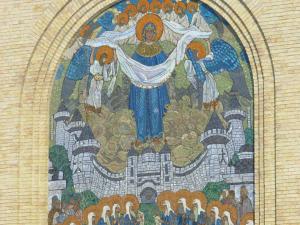Most holy Mother of God, today we Orthodox joyfully celebrate thy coming among us. As we gaze at thy icon we cry with compunction: Shelter us under thy protection, deliver us from evil, and pray thy Son Christ our God to save our souls (Troparion of the Feast of the Protection of the Mother of God).

In the tenth century, the Fool for Christ, St. Andrew, had a vision of the Theotokos praying for the world while spreading her veil over the church he was in. His disciples, St. Epiphanius, also saw her. This vision, once it was examined and determined to be authentic, became one of the most beloved representations of Mary in the East. Mary, the Mother of God, Mary, the spiritual mother of all Christians, looks after and protects her children. Though we might not note it, her presence remains with us, and her veil, far from being used to hide her face from us, covers the faithful and brings them together with her.
If we reach out with our hearts, we might begin to sense Mary’s presence with us, her kind, maternal presence which responds to our love with her great and holy love. She looks down upon us as her own. As Sergius Bulgakov preached, the pains and sorrows of the world fill her heart with great compassion, and so she makes sure she is with us, beside us like she was beside Christ on the cross, making sure we are not alone:
The world is suffering. The heart of the creature is weeping. The crucified soul languishes in the forsakenness by God on the cross. But the world is not forsaken in its sorrow. Man is not alone in his pain. The maternal heart is wounded and torn: together with us, the Mother of God weeps over us. The tearful prayer of the Most Pure One is a prayer with us and for us. And we know whose heart we wound with our sins; we know by whose tears our fall is washed clean. Every creature knows that it is not forgotten by the Mother, to whom every human soul is dear. What consolation is greater than this?[1]
Pope Francis, in Laudato si’, likewise wrote of Mary’s concerns for us and the whole world. The pain she felt for Christ at the cross, she continues to feel with the poor and oppressed, as they suffer at the hands of those in positions of power:
Mary, the Mother who cared for Jesus, now cares with maternal affection and pain for this wounded world. Just as her pierced heart mourned the death of Jesus, so now she grieves for the sufferings of the crucified poor and for the creatures of this world laid waste by human power. Completely transfigured, she now lives with Jesus, and all creatures sing of her fairness. She is the Woman, “clothed in the sun, with the moon under her feet, and on her head a crown of twelve stars” (Rev 12:1). Carried up into heaven, she is the Mother and Queen of all creation. In her glorified body, together with the Risen Christ, part of creation has reached the fullness of its beauty. She treasures the entire life of Jesus in her heart (cf. Lk 2:19,51), and now understands the meaning of all things. Hence, we can ask her to enable us to look at this world with eyes of wisdom. [2]
Our pains and sorrows, but also the pains and sorrows of the whole world, are seen and known by Mary. The poor and oppressed of the world, indeed, the world itself, has consistently suffered at the hands of those who glorify cruelty instead of justice. Mary, however, rejoiced in the way God has worked through her to overcome such cruelty, for she knew that through her, the Messiah would come, fulfilling God’s promises to the lowly:
He has shown strength with his arm, he has scattered the proud in the imagination of their hearts, he has put down the mighty from their thrones, and exalted those of low degree; he has filled the hungry with good things, and the rich he has sent empty away (Lk. 1:51-3 RSV).
Mary, the Mother of God, through whom the kingdom of God has become immanent with the world, continues to work for and promote the needy and the oppressed over the cruelty of the powers that be. If we properly reflect upon the meaning of the Feast of the Protection of the Mother of God, we will reflect upon the way Mary continues to be a vessel by which God’s justice will be accomplished. Fools for Christ honor her and are honored by her more than those who pretend to be wise due to their fame, money, and power. Likewise, the poor and needy continue to be in her heart, and when anyone in a position of authority, secular or religious, reject their needs, or the needs of the earth, they contend against Mary herself.
It is important for us to realize that many so-called religious leaders, priests, bishops, monks, nuns, scholars, despite claiming they honor and respect Mary, speaking and writing great things about her, act in contradiction to what she represents. How can anyone claim that they love Mary when they hate her children and trample them down? This brings us to the Gospels, where we hear of someone in the crowd pretending to honor Jesus by honoring his mother. Despite the way some try to read the passage, Jesus did not reject such honor for his mother, rather, he questioned the reason why she was being honored. When someone honored Mary, they should not do so as a way to excuse themselves from following him and doing what he has taught them to do:
As he said this, a woman in the crowd raised her voice and said to him, “Blessed is the womb that bore you, and the breasts that you sucked!” But he said, “Blessed rather are those who hear the word of God and keep it!” (Lk. 11:27-28 RSV).
Mary heard the Word of God and said yes to it; she kept it, and so she is indeed blessed. Jesus did not deny her holiness, just as Jesus did not deny his own goodness when someone tried to show false honor to him by calling him a good man, but rather asked as to why he was being called good (cf. Lk. 18:19). Jesus was not one for false praise; even if what was said could be interpreted as true, if the intention was not good, it turned the words into falsehood. Those who like to shower Mary with praises in order to have her look kindly at them need to realize it is not the words, but the heart which matters; those who call upon her to promote some evil undermine the very words which they use. If they will not stand with Mary against rich and mighty when the rich and mighty abuse others, their words will be in vain, and so their words might end up being vain repetition if they sing her praises constantly while working against her and her heart’s desire.
The vision St. Andrew had of Mary’s protecting veil represents not just a spiritual reality, but also an earthly one as well. Her children, those who truly follow her, will continue to work for and support her desires, and so become a part of her protecting veil across the earth. The poor nun who helps abused women, the priest who is jailed for helping migrants, the young woman seeking to preserve and protect God’s beautiful creation by encouraging the world to take climate change seriously, and the young man who offers himself as a human shield to protect homeless men and women from abuse, all represent a part of that veil and a way in which Mary continues to protect the earth today. We are called to be a part of that protecting veil, to truly honor Mary by hearing the word of God and keeping it. That is where our blessedness lies. Will we hear the word of God and keep it, joining in with Mary, and so truly honor her with deeds, or will we just speak vain words and think that is good enough to receive her special blessing upon us when we need it?
[1] Sergius Bulgakov, Churchly Joy. Trans. Boris Jakim (Grand Rapids, MI: William B. Eerdmans Publishing Company, 2008), 12.
[2] Pope Francis, Laudato si’. Vatican Translation. ¶241.
Stay in touch! Like A Little Bit of Nothing on Facebook.
If you liked what you read, please consider sharing it with your friends and family!













